- Before you can study the performance of an operation you need to know exactly what that operation is doing....
- Lookup (get(k)):
- Traverse tree to find k:

- Splay node k:

- Traverse tree to find k:
- Insert (put(k,v)):
- Find location in tree to insert
k:

- Splay node k:

- Find location in tree to insert
k:
- Delete (remove(k)):
- Traverse tree to find k to delete:

- Splay the parent node
of node k:

- Traverse tree to find k to delete:
- Now we need to
count operations:
- A zig/zag operation is
more "costly" than
traverse one link
- We can ignore the cost to traverse the tree to find the key k
- A zig/zag operation is
more "costly" than
traverse one link
- Question:
- What is the cost of these
operations:
- Zig-zig
- Zig-zag
- Zig
- What is the cost of these
operations:
- Right-rotation:

- Left-rotation:

- Zig-zig (1):
- The zig-zig (1) operation:

- Zig-zig(1) =
right-right

- The zig-zig (1) operation:
- The zig-zig (2) operation:
- Zig-zig(2) =
left-left
(It's similar to zig-zig(1))
- Zig-zig(2) =
left-left
- Zig-zag (1):
- The zig-zag (1) operation:
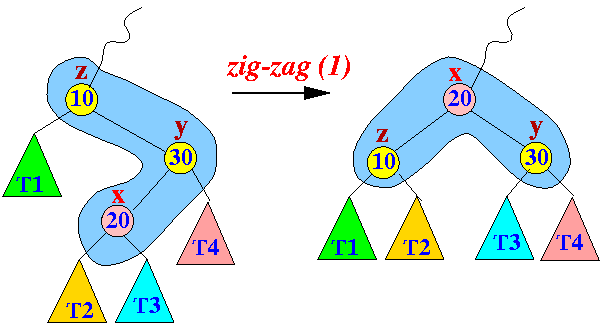
- Zig-zig(1) =
right-left

- The zig-zag (1) operation:
- The zig-zag (2) operation:
- Zig-zig(2) =
left-right
(It's similar to zig-zag(1))
- Zig-zig(2) =
left-right
- Zig (1):
- The zig (1) operation:
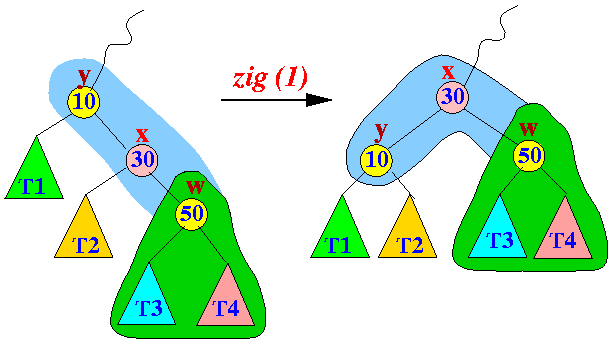
- Zig (1) =
left

- The zig (1) operation:
- The zig (2) operation:
- Zig (2) =
right
(It's similar to zig (1))
- Zig (2) =
right
- Recall:
- The zig-zig operation
moves a node x
up 2 levels
- The zig-zag operation
alos
moves a node x
up 2 levels
- The zig operation moves a node x up 1 level
- The zig-zig operation
moves a node x
up 2 levels
- The cost to splay
a node x at
depth d
(i.e., to make node x the new
root node):
- To splay a node x
at depth d
(d = even), we need:
- d/2
zig-zig and/or
zig-zag operations
= d tree-rotation operations
- d/2
zig-zig and/or
zig-zag operations
- To splay a node x
at depth d
(d = even), we need:
- (d−1)/2 zig-zig and/or zig-zag operations
- 1
zig operation
= d tree-rotation operations
- To splay a node x
at depth d
(d = even), we need:
- Conclusion:
- Cost to splay node x at depth d = d tree rotation operations
- Notations:
- T =
the splay tree with
n nodes
- v =
a node in T
- n(v) =
number of nodes in the
subtree rooted at
v
- r(v) = 2log(n(v)) (the rank of node v)
- n(v) =
number of nodes in the
subtree rooted at
v
- root =
the root node
of the splay tree T
- n(root) =
2×n + 1
- r(root) = 2log(2×n + 1) ~= 2log(2×n) = 2log(n) + 1
Example:

- n(root) =
2×n + 1
- Let e =
a leaf node in T
- n(e) =
1
- r(e) = 2log(1) = 0
- n(e) =
1
- T =
the splay tree with
n nodes
- Prelude:
- Please don't ask
how did they come up with
this amortization scheme
- It's black magic
:-)
- All I will do is show you that it work...
- Please don't ask
how did they come up with
this amortization scheme
- Recall that the cost to
splay a
node with depth = d:
- c(splay node v at depth d) = d (tree rotation operations)
- Recall also that in an
amortization analysis,
we spread the cost by:
- Saving
an additional (extra)
tree rotation operations
per splay tree operations (insert, delete, lookup)
- And we must make sure that the additional (extra) tree rotation operations saved will never become negative (i.e., have enough)
- Saving
an additional (extra)
tree rotation operations
per splay tree operations (insert, delete, lookup)
- Black magic:
The balance (extra amount)
of tree-rotation operations that
you need to keep (save)
in a node v of
the splay tree is:
- Bal(v) = r(v)
Note:
- This is what I refered to as black magic
How did they come up with this number ???
- Example: balance of
tree-rotation operations kept in
node in a splay tree

- Definition:
- r(T) = Total # extra tree operations stored in tree T
Example:

r(T) = lg(15) + lg(11) + 2lg(5) + 3lg(3)
- Example:
splay tree before and after
splay(node 3)

Notes:
Before splay(3): r(T) = lg(15) + lg(11) + 2lg(5) + 3lg(3) After splay(3): r'(T) = lg(15) + lg(11) + lg(9) + lg(5) + 3lg(3) Change in balance: &Delta(r(T)) = r'(T) - r(T) = lg(9) - lg(5)
- We amortize the cost
of a splay operation
on a
node x at depth d
as follows:
- "Pay"
d tree rotation operations
(= the
real cost to
splay
the
node x at depth d)
- "Tag on"
this extra number of
operations:
- &Delta(r(T))
- "Pay"
d tree rotation operations
(= the
real cost to
splay
the
node x at depth d)
- The amortized cost to
splay a node x at depth d:
- Amortized cost of splay(x) = d + &Delta(r(T)) ....... (1)
- Claim:
- The total balance r(T)
of any tree T resulting
from a splay operation satisfies:
- r(T) ≥ 0
(This is trivial because we added in the difference so the total will never become negative...)
- The total balance r(T)
of any tree T resulting
from a splay operation satisfies:
- $64,000 question:
- What is the order of d + Δ(r(T)) ???
To answer this question, we must look at the amortized cost of a tree rotation operation
Because: splay(x) = d tree rotations....
- Consider the right rotation
operation:

- Bigger picture:
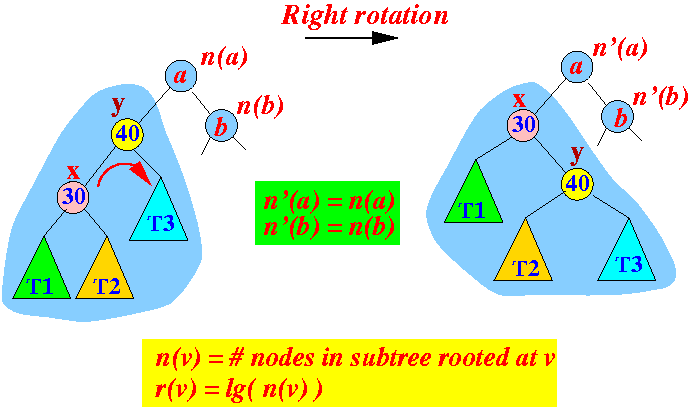
Notice that:
- The tree rotation
does not change the
number of nodes in the
right (other) sub tree
rooted at a
- Therefore:
- n'(v) = n(v) for each node v in the right subtree of a
Notice also that:
- The number of nodes
in the subtrees T1, T2 and T3
are unchanged
- Therefore:
- n'(v) = n(v) for each node v in the subtress T1, T2 and T3
Conclusion:
- The only changes in the n(v) values are at nodes v = x and v = y
- The tree rotation
does not change the
number of nodes in the
right (other) sub tree
rooted at a
- The change in
r(v) of nodes
x and y are as follows:
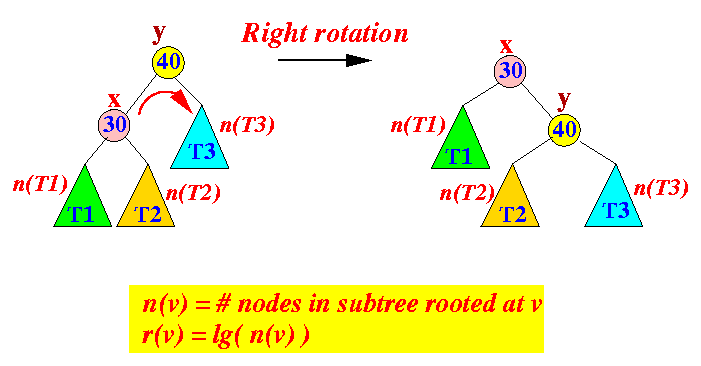
Notes:
- Before the rotation:
- n(x) = n(T1) + n(T2) + 1
- n(y) = n(T1) + n(T2) + n(T3) + 2
- After the rotation:
- n'(x) = n(T1) + n(T2) + n(T3) + 2
- n'(y) = n(T2) + n(T3) + 1
- Before the rotation:
- Total change in
balance stored in tree:
Δ(r(T)) = r'(T) - r(T) = ( r'(1) + r'(2) + .... + r'(x) + r'(y) + .... + r'(n) ) - ( r(1) + r(2) + .... + r(x) + r(y) + .... + r(n) ) = ( r'(x) + r'(y) ) - ( r(x) + r(y) )n(y) = n(T1) + n(T2) + n(T3) + 2 n'(x) = n(T1) + n(T2) + n(T3) + 2 ==> r'(x) = r(y)
From:
Therefore: Δ(r(T)) = r'(y) - r(x) < r'(x) - r(x)
- We can compute the
change of balance caused by
a splay(x) operation
by:
- repeated execute tree-rotation on node x until it becomes the root node
Example:
- Tree rotate on x:
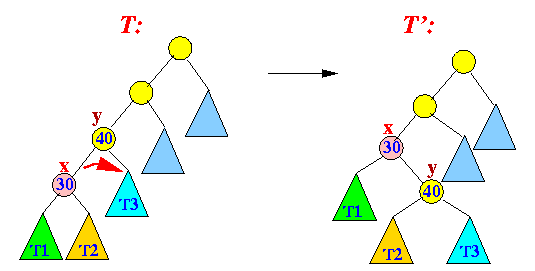
r(T') - r(T) < r'(x) - r(x)
- Tree rotate on x again:
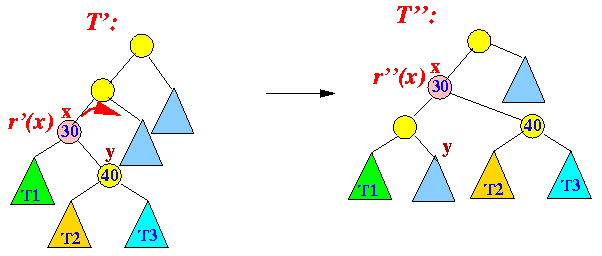
r(T') - r(T) < r''(x) - r'(x)
- And so on....
Until x is the root node:

r(T*) - r(T'') < r*(x) - r''(x)
- Balance change
caused by the splay(x) operation:
r( final tree ) - r( starting tree ) = r(T*) - r(T) = r(T*) - r''''''''(T) + ..... (all intermedtiate trees) + r''''(T) - r'''(T) + r'''(T) - r''(T) + r''(T) - r'(T) + r'(T) - r(T) < r*(x) - r''''''''(x) + .... + r''''(x) - r'''(x) + r'''(x) - r''(x) + r''(x) - r'(x) + r'(x) - r(x) (all but 2 terms cancel each other) = r*(x) - r(x)r*(x) = r(root node) (because x is the new root in the final tree) = lg( # nodes in splay tree ) = lg(n)